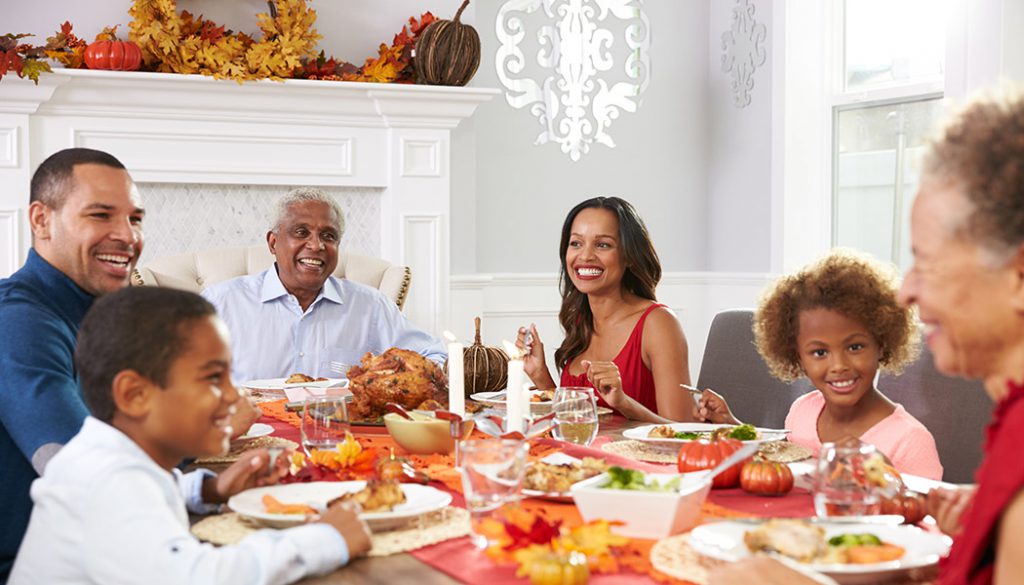A Healthy Thanksgiving
Keeping a healthy and balanced diet is a year-long hassle, but many people grant themselves a bit of leeway around the holidays. With Thanksgiving just around the corner, the warm aroma of turkey and gravy is making nearly everyone anxious for the day of guilt-free indulgence. Unfortunately, there is likely at least one person seated around each grateful table that anxiously wonders how to adhere to their constant diet while still enjoying the holiday with loved ones.
This anxiety could come from someone with allergies, anyone with food intolerances or restrictions, people who avoid alcohol and, especially, gathered loved ones battling diseases such as cancer. This holiday, show thanks for the people joining the celebration by making easy and healthy adjustments to Thanksgiving dinner. The adjustments can be as simple as:
Asking guests about diet restrictions
The first thing you should do is ask your guests if they have any restrictions. It may be the same people attending dinner as last year, but it doesn’t hurt to ask each guest beforehand. It would be awkward to find out Aunt Katherine had been on a vegetarian diet the past six months while serving her a big plate of turkey.
Many cancer patients are encouraged to maintain a healthy diet as part of a routine, but some people with localized cancers have more strict recommendations. To ensure an anxiety-free holiday for all, don’t be shy when it comes to asking about diets.
Introducing ‘mock-tails’
It is never a bad decision to have some kid-friendly beverages at dinner, and it can be a lot of fun for kids and adults alike to be served a fancy alcohol-free cocktail! If table wine is a holiday tradition, be sure to offer a glass before pouring. This will help avoid pressuring guests into drinking if they would rather not.
Researchers have found that alcohol may increase the risk of developing cancer. Many people undergoing cancer treatment are also advised to avoid drinking alcohol. If offering alcohol at Thanksgiving dinner is a major concern, refer back to tip #1 and simply ask if it is alright.
Offering fresh vegetables and fruits
Thanksgiving tables are often full of roasted vegetables, gravy covered potatoes and tasty casseroles. Delicious as they may be, vegetables that are prepared this way are usually chalked full of butter and other ingredients. Don’t forgo the beloved green bean casserole this holiday, but consider also offering a green salad with dressing on the side. It may be the least popular dish, but there’s likely to be at least one person thankful for the addition.
When undergoing cancer treatment, it is crucial to maintain a healthy diet. Medical professionals report that adequate nutrition may reduce treatment side effects, aid in timely treatment and help maintain a high quality of life.
Limiting salt in dishes
It can be tempting to get caught up in salting the mashed potatoes just right or adding just a pinch more salt to the roast vegetables. However, leaving additional salt out of recipes may encourage diet-conscious guests to help themselves to a serving. Though it may be strange to have guests season their own plates, it is far easier for them to add salt than it is for them to remove it.
Studies have concluded that diet can be a vital role in cancer prevention. Avoiding excess salt intake may decrease the risk of diseases, such as stomach cancer. A healthy diet should contain fruits, vegetables, and wholegrains, but it should also exclude high intakes of things such as salt, fat, sugar and alcohol.
Sharing leftovers
There’s rarely a Thanksgiving table that isn’t filled with leftovers at the end of the evening. Consider stocking up on some take-away containers to send guests home with. It will make packing up easy, and no one will need to worry about returning Tupperware.
The holidays are often filled with love and family. Unfortunately, loved ones undergoing cancer treatment may experience a range of emotions from loneliness to depression. These feelings can result in a loss of appetite or difficulties completing simple tasks. Having some leftovers readily available could really help a loved one out in a difficult time. Mental well-being is just as important as physical well-being.
There are many ways to make Thanksgiving dinner inclusive for guests, but the most important part is simply spending time with loved ones. Whatever your Thanksgiving traditions may be, the National Foundation for Cancer Research wishes everyone a healthy and happy holiday!
References:
- https://www.aerzteblatt.de/int/archive/article?id=199686
- https://www.cancer.gov/about-cancer/causes-prevention/risk/alcohol/alcohol-fact-sheet#q3
- https://www.cancer.gov/about-cancer/causes-prevention/risk/diet
- https://www.cancer.gov/about-cancer/treatment/research/nutrition-during-after-treatment
- https://www.cancer.gov/publications/patient-education/eatinghints.pdf












